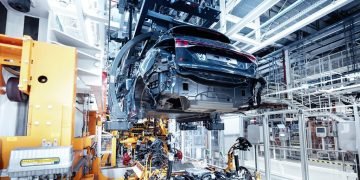By Rayan Amir – March 11, 2025
Audi is redefining the future of automotive supply chains, unveiling an innovative logistics strategy that seamlessly integrates automation, digitalization, and human expertise. As global supply chains become more complex, the German automaker is taking a hybrid approach, balancing cutting-edge robotics with skilled workforce contributions to optimize efficiency and sustainability.
The Evolution of Audi’s Smart Supply Chain
With the rise of Industry 4.0, automation has become a driving force behind logistics innovation. Audi is leading the way by implementing:
- AI-Driven Predictive Analytics: Advanced data modeling to anticipate supply chain disruptions and optimize inventory management.
- Autonomous Guided Vehicles (AGVs): AI-powered mobile robots that streamline warehouse operations and reduce human error.
- Smart Factories with Digital Twin Technology: Real-time simulations that provide full visibility into logistics flows and manufacturing efficiency.
By leveraging automation, Audi aims to accelerate production timelines, reduce costs, and enhance supply chain transparency, ensuring that components are delivered just-in-time to global manufacturing hubs.
The Balance Between Automation and Workforce
Despite the rise of robotics, Audi emphasizes that automation will not replace human expertise but rather enhance it. The company is investing in upskilling employees, enabling them to work alongside intelligent robotic systems and manage high-tech logistics environments.
“Technology alone cannot drive the future of logistics,” says an Audi executive. “A successful supply chain is one where automation and people work in harmony, creating an ecosystem that is resilient, adaptive, and sustainable.”
Sustainability at the Core of Audi’s Supply Chain Transformation
As part of its global sustainability strategy, Audi is prioritizing eco-friendly logistics solutions, including:
- Green Transport Initiatives: Increasing the use of electric and hydrogen-powered freight vehicles.
- Circular Economy Practices: Reducing waste by recycling automotive parts and optimizing material usage.
- Carbon-Neutral Warehousing: Implementing energy-efficient supply chain facilities that lower environmental impact.
With regulatory pressures mounting, Audi’s proactive stance on sustainable logistics sets a benchmark for the automotive industry.
Conclusion
Audi’s hybrid supply chain model, which merges automation with human expertise, is set to reshape the automotive logistics landscape. By combining AI-driven technology, workforce innovation, and sustainability efforts, the automaker is establishing a blueprint for the future of automotive manufacturing.
The Logistic News will continue to provide exclusive insights into groundbreaking supply chain transformations and technological advancements.
Stay updated for more reports on the latest innovations in automotive logistics and supply chain digitalization.























